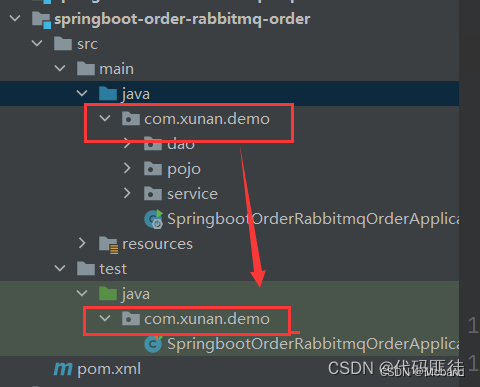前言
使用SpringBoot 测试类可在不需要启动程序时,即可使用。当你运行你的测试方法时他会自己启动程序调用所需使用到的mapper,service接口,实现方法。故而可在测试类中像编写正常service方法一样编写代码
一.依赖录入
<!--Spring Boot 测试--><dependency><groupId>org.springframework.boot</groupId><artifactId>spring-boot-starter-test</artifactId><scope>test</scope></dependency>
二.编写测试类
importcom.sinosoft.springbootplus.AccidentApplication;importlombok.extern.slf4j.Slf4j;importorg.junit.Test;importorg.junit.runner.RunWith;importorg.springframework.boot.test.context.SpringBootTest;importorg.springframework.test.context.junit4.SpringRunner;@SpringBootTest(classes =Application.class)@RunWith(SpringRunner.class)@Slf4jpublicclass test {@AutowiredXXXService xxxService;@TestpublicvoidtestDemo(){// ...}}
在这里讲解下几个注解的作用及流程
1.@SpringBootTest(classes = 启动类名称.class)
基本等同于启动了整个服务,此时便可以开始功能测试。
注:
1)如果注解@SpringBootTest(classes = 启动类名称.class)中配置了项目启动类,则该测试类可以放在test.java下任何包中
2)如果注解@SpringBootTest没有配置里面的参数classes = Application.class,则需要确保test.java下的测试类包与启动类所在的包一致,即在test.java下也需要创建com.xunan.demo包,并将测试类放在该包下。
不然会报 Unable to find a @SpringBootConfiguration, you need to use @ContextConfigura错误
2.运行器指定@RunWith
在JUnit中有很多个Runner,他们负责调用你的测试代码,每一个Runner都有各自的特殊功能,你要根据需要选择不同的Runner来运行你的测试代码。一般使用@RunWith(SpringRunner.class)
版权归原作者 Mcband 所有, 如有侵权,请联系我们删除。